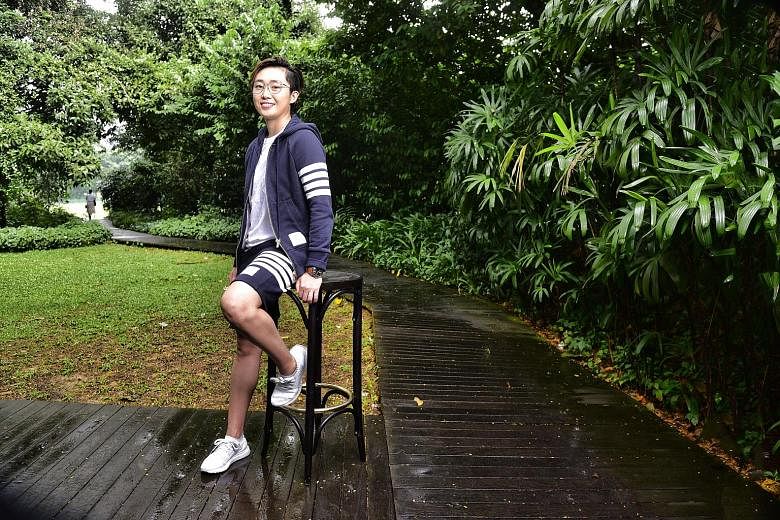I can't help staring at Feng Tianwei when she arrives.
We're at a table next to the window at PS Cafe in leafy Harding Road and sunlight is streaming in.
Based on photos I'd seen of Singapore's top table tennis player, I'm expecting someone boyish and fierce-looking.
Instead, up close, Feng looks feminine. Her hair is short but her features are pretty and delicate and her complexion is fair and unblemished. Her teeth, I notice, are very white.
She's sporting round fashion glasses and is trendily dressed in a navy blue Thom Browne hoodie and matching shorts over a white Champion T-shirt, and white adidas shoes.
Singapore's three-time Olympic medallist has a quiet, serious manner and takes a while to warm up. When she does - like when I ask her if she's interested in fashion and she grins and says, yes, she actually is - you catch a glimpse of a different side to her.
My Mandarin is poor and she doesn't speak much English. May Chen, a correspondent with The Straits Times' sports desk, is helping us translate.
Her answers are thoughtful and she doesn't beat around the bush or try and impress you. I sense in her a steely resolve and strong sense of self-belief.
Feng, who is now in Kuala Lumpur for the SEA Games, says she's chosen PS Cafe because she likes the natural ambience of the Dempsey area. It is also why the Botanic Gardens is one of her favourite places.
She has come from morning training and is, I suspect, hungry. She orders French onion soup, spaghetti bolognese and fresh orange juice, and polishes off the food when they arrive.
IN OCTOBER last year, the Singapore Table Tennis Association (STTA) said it was not renewing Feng's contract as it wanted to make way for new blood.
The news came as a shock because Feng remains Singapore's most bemedalled Olympian and, at 30 - she turns 31 on Aug 31 - is still the world No. 6 player.
In the 2008 Beijing Olympics, she was part of the team that won Singapore a silver. In the 2012 Games in London, she won a team bronze and an individual bronze. She has been world No. 2 several times, the last in August 2011.
The two parties have since reached an understanding. While she is no longer with the STTA, she has been selected for the national squad for the SEA Games and has been training with the team.
I ask what it's been like going solo. "Of course there are a lot of difficulties," she says. Previously, everything was taken care of for her, but she is now in charge of everything from getting a coach to sparring partners to her diet.
She currently weighs 58kg to 59kg on a 1.64m frame. She had previously lost weight to put less pressure on her knees. "But I found that it wasn't good to lose too much because I didn't have strength in training or competition either."
What she finds hard about going solo is doing her accounts. She pays someone to do that and has also signed up with an agency for promotions-related work.
"This is a new journey that I have to face myself," she says.
Are you happier? "I'm able to concentrate on my training and competition because I handle it myself. I'm able to enjoy it more," she says.
I wonder if Feng the competitor is different from Feng outside the sporting arena. "Very different," she says. "During a competition, you are constantly pushing yourself towards victory, but I'm a very easy-going person out of competition."
She describes herself as introverted and says she doesn't really like to talk much or go out.
"Some people may think I'm quite unapproachable, or look unfriendly, or behave like I'm a star. But I just am not the kind to take the initiative to go up to people and talk to them. I'm just quite a passive person... I've always been like this."
Are there questions you don't like being asked? "Questions about my private life," is her quick reply. "I'm a Virgo. Firstly, I don't like to talk about other people's private matters and, secondly, I don't like to talk about my private matters. So my life is quite dull because I'm not into gossip at all." She laughs.
She does compromise, though. When I ask if she's single, she says "not single" - but adds gently that "I prefer to keep things that are private, private".
Being dropped from the STTA, however, has meant she has to shift gears a little. "Now, I force myself to take the initiative, to come out of my shell more. Because I've had to do everything myself now, I need to be the one communicating."
And indeed, she seems to be making an effort. She recently launched her own Facebook account - there is already a fan page - and an Instagram account (@feng_tianwei31) where her fans get more than just photos of her at competitions.
SHE was born an only child in the city of Harbin in the northern province of Heilongjiang. Her father, Feng Qingzhi, a granary worker, died of multiple sclerosis when she was 16 and her mother worked in accounting. Of Harbin, she remembers the ice and snow and its Russian-inspired architecture.
I ask her for a happy memory of her childhood. She thinks a bit then recounts how, when she was about seven or eight, she attended a school sports day with her parents. "We bought little snacks and just had a fun time. Parents would also take part in the sports, and there were activities like rope-skipping."
She learnt to play table tennis when she was five because it was a popular game in the north. "It's also a sport that's not so harsh on a girl's body. Swimming, for example, can be a lot more exhausting." She can't swim and is afraid of the water.
No one in her family was particularly athletic but she shone in table tennis, winning age-group tournaments at city and provincial levels. Her mother didn't force her to play. "I'm the one who pushes myself harder."
She went to boarding school in Harbin when she was 12 to hone her skills. She later got accepted into China's national B squad. When she was 16, some months after her father died, she left school and went to Beijing to train with the national team. Her mother stayed behind in Harbin.
"I don't think I had much of a childhood," she says matter-of-factly. "All my time was spent on training. The cartoons and stuff that people my age watched or knew, I know nothing about it, even now."
She was in Beijing for two years but over-exerted herself and discovered some issues with her heart. Frightened, she put aside her dream of being in the Chinese national team and moved to Japan to play professionally at club level. Her medical issues were resolved.
In 2006, she was spotted by an STTA coach. She was invited to train in Singapore under the Foreign Sports Talent scheme and became a Singaporean in 2008.
IN THE 10 years she's been here, she has grown used to the humidity and now misses Singapore food when she's away.
She has not had the time to master English, a source of consternation among some Singaporeans who continue to gripe that by not speaking it, she is still too Chinese.
She is stoical about these criticisms and says it's a matter of time before she is more fluent in the language.
"When you're playing table tennis, your whole mind and body is entirely focused on sport. You're unable to devote yourself to a second thing," she says. If she had tried to learn English on top of table tennis, she would have ended up doing well in neither.
She and the other Chinese-born paddlers know it's important to speak English. "It's not that we don't want to speak English. But the environment that we're in currently just means it's quite hard to do it."

She lives in an apartment in Ang Mo Kio and her mother, Li Chunping, spends half the year with her. Her mother spends much of her time here with church activities. Feng is close to her mum, who's 54, and rues: "All these years, I've only taken her to the movies maybe once or twice."
If there's anything she has missed out on, it is school life. "I do desire the collegiate lifestyle quite a bit. But the thing is, I can still go for my studies when I'm done with sport, but if I were to do it the other way, it wouldn't be possible."
I remark that she seems to have led a lonely life. She laughs at this and assures me: "It's okay. I don't feel I'm lonely although people may think I look lonely. I actually quite enjoy my lifestyle. Staying at home to read a book - it's all enjoyment to me. If I were to go out and socialise, it can feel exhausting. I like a simple life."
She is gunning for the 2020 Games in Tokyo but knows that a table tennis career beyond a five-year timeframe is less certain.
Transiting to a new phase of life is very important but also difficult for an athlete, she says. "If it happens sooner, maybe you'll have the drive and desire for it. But if you do it only when you've no other choice, because you can't play anymore, then it will probably be harder."
She's long done with her food, and May and I finally catch up. She doesn't want dessert but gets a coffee.
I ask her what's the best thing about being a successful sportsman and I'm expecting an answer about the thrill of victory. But she says it is "to know that you're a person of influence".
Maybe I look sceptical, for she elaborates. The ability to influence and inspire people - especially children - through what you do is something very special, she says.
Not the winning bits, I persist?
"Of course there was a period when I enjoyed winning. But you realise that winning medals is temporary. What really lasts, what people remember you for, tends to be something that you don't see, and maybe don't even put emphasis on."
It is for this reason that when people ask how she copes with losing, her answer is this: "The real meaning of your journey towards trying to become a champion lies in what you did, not in what you became in the end.
"Of course, you want to be what you dream of, but if you don't get there, whatever you put in during that journey is something that belongs to you, and that's not a waste."
Athletes, in the eyes of many people, are just "brute, physical specimens", she says. "But actually, the successful athletes are people who have put a lot of thought into what they do or did. You don't become successful just like that."
As we wrap up the meal and she heads for her afternoon training session, it strikes me that Feng - physically talented, personally motivated, thoughtful and resolved - is a champion on many counts.
Twitter @STsumikotan
Correction Note: The story has been corrected to reflect that Harbin is the capital city of Heilongjiang province. We are sorry for the error.




